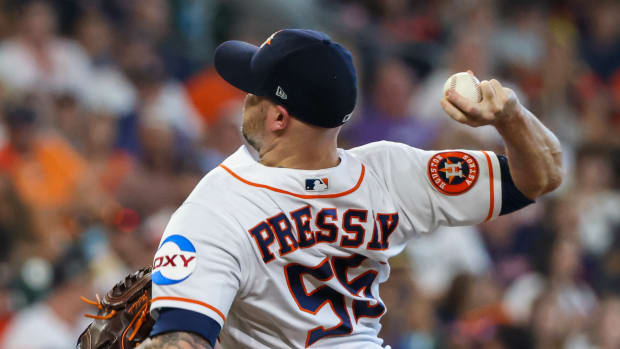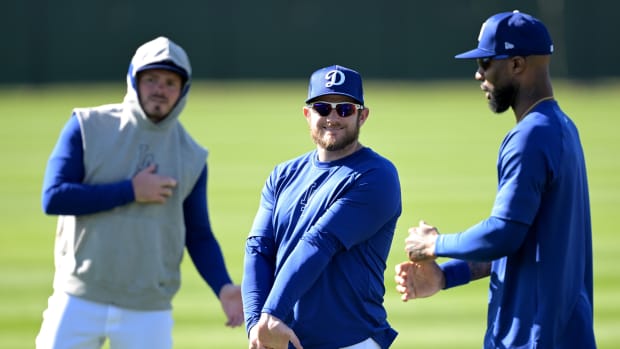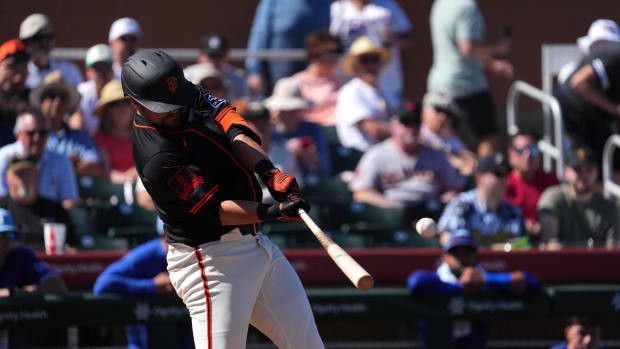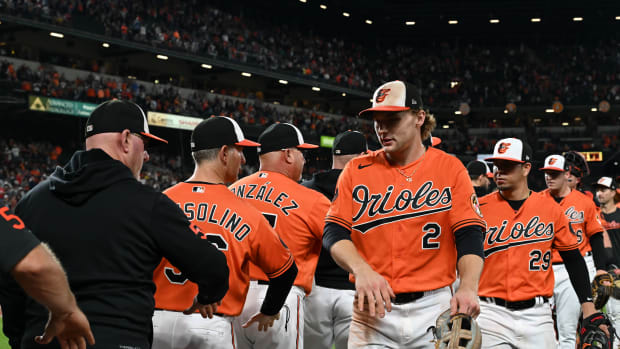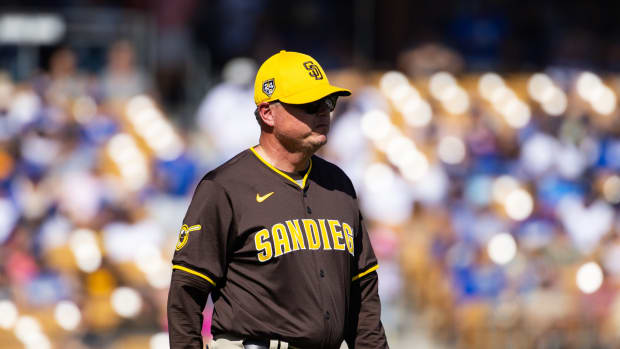YOUR 2018 CHAMPS: Why the Astros Will Repeat Next Season as World Series Champions
LOS ANGELES—It all started with Springer. Anyone with the Astros will tell you that.
When Jeff Luhnow and his crew of rebuilders arrived in Houston before the 2012 season, George Springer was already there. No, not in Houston, yet; he was still two years from reaching the big leagues. But he was in A-Ball, after Ed Wade’s ousted regime had drafted him 11th overall in June 2011 and left him for the ravaged organization as a parting gift. Springer was the type of player, with every tool you could want, with whom and around whom you might make something.
Jose Altuve and Dallas Keuchel were there, too, and part of the new leadership’s genius was that it was smart enough not to dispense of them—even if it got rid of most everything else—because back then they looked like a slap hitter and a soft tosser and little more. But Springer looked like a star. If the front office ever allowed itself to dream of a championship, he was the person they imagined raising the trophy.
When Sports Illustrated imagined, three and a half years ago, the event that would occur this autumn, Springer was at the center of it, too. He was the player we put on the cover—partly because his swing was so photogenic, especially when he took it wearing those throwback, rainbow uniforms. But if there was anyone likely to last through the resolution of our prediction—to force it into reality, in fact—it was him.
About That Prediction ... How the Astros Went From Baseball's Cellar to the 2017 World Series
And he did. Springer, now 28, scuffled badly all October, and that continued through the first game of the World Series. But manager A.J. Hinch, who believed in the player more than his recent performance, kept him atop the lineup. Then he became not just George Springer again, but a better version than anyone had ever seen
He was named the World Series MVP on Wednesday night, after the Astros’ unexpectedly easy, 5–1 Game 7 thrashing of the Dodgers, and there was no other choice. He had eight extra base hits, an all-time World Series record. He accumulated 29 extra bases, a record. He hit five home runs, tying a record. He homered in four straight World Series games, the last four, the only player to do that other than Lou Gehrig and Reggie Jackson. It all ran though him. “A crazy journey,” he said in the cigar smoke-filled visiting clubhouse. “A wild ride. The organization has come so far in three years.”
Here is the disturbing part, for the rest of baseball: the journey was not designed to end now. They didn’t spend all those seasons in baseball purgatory or somewhere worse—“Through the lean years, I wouldn’t have even wanted to come as a fan,” Keuchel said earlier this month—for a single shot at a championship, one and done. If their run of 106-plus losses between 2011 and '13 represented the nadir, then 2017 alone was never meant to represent the summit, but the first peak in a tightly-packed range.
It’s harder than ever to win back-to-back titles, in a Wild Card era with an exhausting and randomizing playoff structure. The Yankees won three in a row, between 1998 and 2000. The Blue Jays won two, in '92 and '93. Those were the only times it’s happened since the 70s. If any team is built to do it, it’s these Astros.
Start with the offense, the best in the league, which somehow nearly accomplished the virtually unprecedented feat of finishing first in homers (they trailed the Yankees by three) and last in strikeouts (which they were). Their four most important hitters, the first four batters in their World Series lineups—Alex Bregman, Carlos Correa, Altuve and Springer—are all 28 or younger. Bregman and Correa are just 23. Altuve won’t reach free agency until 2020, Springer until '21, Correa until '22 and Bregman until '23, so long from now that the World Series might then be contested between machines.
In fact, the Astros’ only offensive free agents of note are Cameron Maybin, a late-season addition to the bench, and Carlos Beltran, who for $16 million this year provided more in the way of wisdom and discipline than production—though the wisdom and discipline was invaluable—and whose lessons are now well absorbed as he probably departs, perhaps for retirement, with the ring he’s sought for so long.
“It only took 20 years to get to this position,” he said on the field on Wednesday night, a championship cap on his head and his young son, who kept playing with his father’s ear, in his arms. “It’s a great future here. You look at the ballclub, you look at every position, you see guys that can impact the game and be impact players for a long time.”
While they might add a major free agent piece to their lineup—someone with Beltran’s savvy, perhaps, but also a still-lively bat—it will sooner or later be buoyed by the promotion of top-10 prospect Kyle Tucker, who is 20, or by an increase in playing time for the 24-year-old–five-tool threat Derek Fisher. Both those players are lefthanded prospects, which is important, as the Astros' four centerpieces all bat from the right. That’s no coincidence. Everything is by design. The offense isn’t going anywhere.
Neither is the rotation. Keuchel and Charlie Morton are both on board for next year. Lance McCullers—the Game 7 starter—is under control until 2022. Behind them is a pair of quickly rising prospects: 20-year-old Forrest Whitley, who stands 6’7” and struck out nearly 14 batters per nine in the minors this year; and 21-year-old Francis Martes, who wet his feet, mostly in relief, with the big club this summer but whom Baseball America last winter named the game’s 20th-best prospect.
The key, at least in the near term, is Justin Verlander, whom the Astros acquired from the Tigers with two seconds to spare before the Aug. 31 deadline. A lot was made of the enormity of the contract the Astros were assuming: $28 million in each of the next two years for a pitcher who turns 35 in February. It’s a hefty sum, even if the Tigers are picking up $8 million a year. But here’s the proper way to look at it: Were Verlander, who went 9–1 with a 1.66 ERA for the Astros in the regular season and playoffs combined, a free agent this winter, you couldn’t possibly sign him, nor anyone else like him, for just two seasons. You’d have to give him perhaps five years, probably at an average annual value that exceeds $20 million, knowing that a few of those late-30s years would probably be wasted. Even accounting for the three talented prospects the Astros gave up for him, it was a good deal—and is almost certain to continue to be so for the next two years, in which he’ll remain the alpha dog and a Beltran-like influence.
Luhnow and Verlander walked off the field and into the increasingly humid clubhouse together. “Two more to go,” the GM told his still new ace.
Then of course: the bullpen. Something’s got to be done about the bullpen. It wasn’t good during the regular season, with a 4.27 ERA ranking 17th overall. It was much worse during the playoffs, and it’ll lose Tyler Clippard, Luke Gregerson and Francisco Liriano, though they were all rarely used. Still, Ken Giles almost certainly won’t continue to be the Ken Giles of the past month. Brad Peacock and Collin McHugh could relinquish their spots in a newly deepened rotation only to excel in the 'pen. Joe Musgrove, spotty during the playoffs but a shutdown reliever over the second half, should continue to develop in that way too; he’s only 24. They could certainly use a lefty—maybe two—to replace Liriano and the effective Tony Sipp. Jake McGee and Tony Watson, the latter of whom watched Game 7 from the Dodgers’ dugout, are the cream of the free-agent crop. Their agents ought to answer calls from a Houston area code this winter.
WATCH: Astros Clinch First World Series Title in Franchise History
And they have their process—Astroball, it might come to be called—the one they implemented in 2012, the one they now know works. Yes, it relies heavily on math and probabilistic modeling, and yes, it does assign every player a projected value, but it was never as soulless as its critics—and there were so many, when they tore the organization down with an eye only on the future—believed.
The front office’s genius was that it realized that hard data meant a lot, and it conjured all sorts of new ways to harness it, but it also realized that it wasn’t nearly everything. What scouts saw and processed the old-fashioned way, via their eyes and their experience, mattered just as much, if not more. That was why the Astros ended up with players like Bregman and Correa, who are never afraid even though they are just 23, and who will drive them to the future.
General manager Jeff Luhnow, assistant GM Mike Elias, and special assistants Kevin Goldstein (the scouting guru) and Sig Mejdal (the data guru)—not to mention an analytics department, nicknamed the Nerd Cave, that has now swelled to nine members—will remain. The only way any of them likely to leave now is if they’re offered the top job somewhere else, as Luhnow was when he was with the Cardinals, and as Luhnow’s former assistant David Stearns was by the Brewers. That, of course, is a greater likelihood today than it was yesterday.
WATCH: Astros Clinch First World Series Title in Franchise History
The road will get rougher, starting tomorrow. Now that there won’t be any more 100-loss seasons, and more 100-win ones, they won’t pick near the top of any draft any time soon. The Dodgers will still be there. So will the Cubs. The Yankees are coming. In a few years, so will those teams that are only now doing what the Astros did during those dark years: the Padres, Phillies, and White Sox.
But the Astros are the kings, and they’re unusually well-positioned to hang onto the crown even as all those usurpers come for them. It all goes back to Springer. He was the seed from which all of this bloomed.
In the clubhouse, a goggles-wearing Luhnow stood mere feet from where the MVP was surrounded by reporters.
“When Springer arrived in the big leagues, in '14—well, there’s a Seinfeld episode, the Summer of George,” the GM said. “He infused such great energy into our team, that from that point I knew it’d be up, not down.”
Now there’s nowhere left to climb, just an altitude to maintain. This team is not just YOUR 2017 CHAMPS. Here’s a new prediction. We’re looking at YOUR 2018 CHAMPS, too. We might as well get to work on a new cover.
That was for tomorrow. Someone passed Springer the trophy. He raised it over his head and shouted to his teammates. “Here it is!” he screamed. They all roared back.































